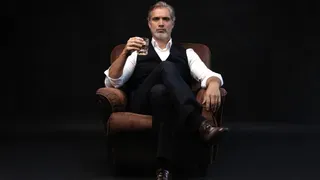April 21, 2014
Sequence Six: "But Wait! There's More!"
Kilian Melloy READ TIME: 7 MIN.
"Explain it to me again."
Caduceus Trimble, at age 104, was no longer physically imposing, but he retained a way of commanding respect -- and, just as importantly, obeisance.
"It's very simple, really," the chipper young technician said, his movements brisk as he prepared the equipment. "We put you to sleep for a few hours and while you are sleeping we make a complete neuro-holometric scan of your memories and engrams. In other words, it's a digital duplicate of your thoughts, your recollections, your responses..."
"My mind," the old man put in impatiently.
The technician's efficient hands were now darting with a swab, cleaning and preparing Trimble's cranium. "In effect, yes, that's right," he said. "Then we transmit that holometric record back in time to the selected year, targeting your younger self. He will go to sleep in the evening as usual but when he wakes up... he will be you as you are now. Mentally, I mean. Physically, he will still be 24 years old, which is, of course, the point: You will have eight decades to live over again."
"That's what I don't understand," Trimble said. "That right there. I want those years back, but... isn't it going to create some kind of... I mean, you know... paradox? If I wake up at age 24 with eighty extra years of knowledge and experience in my head, then I am not the person I was in 1988. And if I am not the person I was in 1988, then I make different choices. And then history unravels... How does this not
happen?"
"It will be a completely new history," agreed the technician.
"But won't that destroy the universe or something?"
"No." The technician paused to look Trimble right in the eye, and his face lit up with a dazzling smile -- the smile of the excited tech-head. Trimble had seen that smile on the geeks he had hired, fired, and exploited all through his long career as a visionary in the field of applied technology. He never understood the mathematics or the weird theories behind the work, but he always knew when something profitable was there by the way tech-heads radiated joy when discussing the potential for some new line of research.
Trimble waited to understand why the universe would not vanish in a puff the moment his contemporary self was transmitted into the skull of the kid he once had been.
"We will be creating an entirely new universe," the technician said, with a zing in his voice -- as though he had just pulled a sheet across empty space to reveal a new car sprung from nothing.
A new universe... now, that really was some slight of hand. But Trimble didn't share the kid's elation.
"That's the problem," the trembling Trimble insisted. "The new universe... won't it erase the one we live in now?"
"No, because the two will co-exist simultaneously," the technician said. "Didn't anyone go this with you?" Before Trimble could respond, the technician was off on a lecture, his voice warming, his brisk, businesslike gestures becoming illustrative and grandiloquent.
"You know the principle behind quantum computing, right? We're doing more data processing than the capacity of our hardware should allow, because we are drawing on the processing power of computers that are operating in multiple parallel universes?"
"I've heard of it -- but I never understood it..."
"Well, you know about transphasic crystals, right?"
"I," Trimble said with a glint of his habitual arrogance, "underwrote the first research into transphasic crystals."
"Then you understand that what makes them so special... what makes all transperiodic physics possible, including this procedure we're preparing for... is they vibrate at two frequencies at the same time. That means they exist in two separate, parallel universes simultaneously."
Trimble gave the kid a puzzled glance that conveyed the exact opposite: He didn't understand this at all, and he never did, no matter how many times his science executives and corporate research advisors explained it. It all had something to do with tiny vibrating strings that were really closed loops of energy, but those loops somehow interacted to create overlapping fields... and it all came down to quarks being crystallized knots of information... not energy or matter at all, one of his best science executives had explained, but information.
The universe was made of information.
"The universe is made of information," Trimble threw out.
"Exactly!" The tech beamed. "You understand that the cosmos is not just a single thread stretching from a point of creation to an omega point of ultimate dissolution. It's more like yarn, made of lots of threads all twined together. And like yarn, cosmic history is fuzzy - because of quantum indeterminism."
Trimble's expression was one of indeterminism, too, and the technician saw this. "In essence," he said, "the cosmos includes not just our experience of events, but also alternatives to those events. If you turned right at an intersection, that's only part of the real picture: You also turned left."
"Not if I knew where I was going," Trimble rasped.
"Actually, yes, even then. In some alternate iterations, you were distracted or confused and turned the wrong way. Or there was a detour. Or your destination actually was to the left instead of the right. New histories arise from each decision point, and then proliferate with subsequent new decision points. On a cosmic level, all those possible histories blur into one average history. But each thread also retains its own individual integrity."
"What does that mean for me going back to live my life over?" insisted the always-pragmatic Trimble.
"Well, up to the moment your younger self goes to sleep on the target day, it's the same past you recall -- the past the way it's already happened. But when we reformat your younger self neurologically with your current memories and engrams, then we create a whole new thread -- a whole new life and history -- from that point on. That thread becomes part of the cosmic yarn. But because it's a new alternative history, it doesn't displace anything that already existed. Decision points give rise to alternative histories all the time -- it's part of nature. All we're doing with this procedure is generating a decision point artificially. The natural course of hyper-time and hyper-event will do the rest."
Trimble still didn't understand. But he knew how to get there. "So...?" he asked in a leading tone.
"So, the history you have lived remains intact. And a whole new history, separate and also intact, is also created. You live your life over again -- not the same as it was, but in a newly generated alternative history. You will be free to do as you like, rather than feeling obligated to replicate the course of events as they originally took place."
Now Trimble was stating to understand the general idea, but it gave rise to something he didn't like.
"What happens to me in this universe?" he asked, apprehensively.
"Nothing," the technician said, chipper as always, fastening leads to Trimble's nearly hairless skull, handling the old man's delicate skin with care. "You wake up in the morning after a good night's sleep."
"So it's -- it's just a copy of me that lives a whole new life?"
"Well, yes," the tech said, seeming startled that Trimble hadn't known this.
"And I... the me that's talking to you now... I stay stuck here, in this dying body?"
"Yes," the tech said. "But also, no. You -- really you, the you who is talking and thinking right now -- you also live a whole new lifetime."
Trimble frowned.
"Both versions are you. You become transphasic, in a manner of speaking. You exist in two places and times at once."
"But the I who is still here is... is still here, and is still going to die soon," Trimble cried.
"That's why," the technician said, smoothly sitting down in the chair next to Trimble's bed and producing an electronic clipboard, "in addition to the basic package -- which you have already purchased -- we also offer an enhancement rider: The unification option."
Trimble clenched his teeth. Here came the hard sell. He really should have anticipated it. "What the hell is that, and how much does it cost?" he growled.
"Once we complete the neuro-holometric scan, we keep you in a state of deep, induced coma so that your brain processes no new input," explained the tech. "In effect, the you that remains here is zeroed out. The only you that remains active is the you that is in your younger body -- in the alternate history. There are no multiple copies of your mentality... except for those arising from this very decision point, in which you will both sign on to the additional option and decline to do so."
Trimble still hesitated.
"But wait," the technician added, "there's more! If you opt for the deluxe guarantee package, we take an extra step to ensure your genuine, unique, and total transfer to the alternate history."
Trimble bit his tongue to stop himself from saying something vicious --�these people had him at a decided disadvantage, after all -- but he couldn't restrain a roll of his eyes.
The tech blithely carried on. "We crosslink input from the brain your other self into your brain here, so that while there are two versions of you --�one young, and one old -- the only data input either version takes in is your life in the alternate history."
"As a young man," Trimble said.
"That's right. This creates a reinforcement effect so that both versions have the exact same experiences. When your body and brain here die, the divergence resolves... and you, yourself, both iterations, superimpose into one individual: The young one. Really and truly and singularly you. That is to say, the you that's talking to me right now stays alive and young. Guaranteed."
Trimble sighed. "And the price tag?"
The tech smiled sunnily.
Well, he had plenty to smile about -- plenty more of Trimble's money, that is. The additional cost was most of what Trimble had meant to leave to his heirs and assigns. But, ah, what the hell. Trimble was getting what he wanted, too. In the end, we all die alone... or don't. And Trimble didn't want to die just yet.
In any case, Trimble thought to himself, as his gnarled hand gripped the stylus and slowly inscribed his signature on the electronic document, you only live as many lives as you can pay for. And he had a million ideas for his life to come... and the life after that...
For Ken.
Kilian Melloy serves as EDGE Media Network's Associate Arts Editor and Staff Contributor. His professional memberships include the National Lesbian & Gay Journalists Association, the Boston Online Film Critics Association, The Gay and Lesbian Entertainment Critics Association, and the Boston Theater Critics Association's Elliot Norton Awards Committee.



